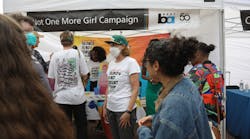BART launches second phase of Not One More Girl initiative
Bay Area Rapid Transit (BART) has launched the second phase of its Not One More Girl initiative, which places emphasis on enabling people to have a greater sense of empowerment in a harassment situation and exhibits tools that fellow riders can use to not only handle a situation but to provide support when harassment occurs.
Not One More Girl is a Black, Indigenous and People of Color (BIPOC) youth-led initiative in partnership with community-based organizations and BART working to end gender-based violence. The movement has become a model in the transit industry providing inspiration for SB 1161, which was signed into law in 2022, as well as SB 434, which is currently moving through the legislature, to address harassment on transit and collect survey data to inform safety efforts.
The Betti Ono Foundation, and The Unity Council’s Latina Mentorship and Achievement Program have also worked within the initiative to involve local high school and college students in the program. This helped to encourage and introduce dialogue on their experiences on transit and voice their ideas for action-based strategies to enhance safety and support people experiencing sexual harassment.
“A big part of harassment is the devaluing of another person and in this culture, we often don’t value people’s voices, especially women, especially women of color," said Karol Suarez, a senior at Oakland School of the Arts.
This past spring, Suarez served as a youth fellow guiding the latest phase of Not One More Girl and helped develop the theme, “Our Story of Courage.”
“This project understands the importance of making people feel comfortable on public transit, a place that is meant for everyone,” Suarez said. “Being a part of this has made me hopeful. It shows me we’re not that messed up as a society. Even this small group is making a big impact.”
The Unity Council, under the leadership of Gabby Guzman, helped connect BART with youth and offered social-emotional support to the fellows throughout the process.
The latest phase includes:
- Three distinct art posters outlining safety tips.
- New bystander intervention cards are now available to riders to discreetly pass to people to prompt bystander intervention actions and report harassment when it is taking place (The cards are available at all Station Agent booths and are being distributed by community partners).
- Beginning Sept. 11th, BART will size trains for safety and run shorter trains to eliminate empty cars, where someone could be left alone as a target for harassment and assault. The schedule change also increases service on nights and weekends, so riders spend less time waiting on platforms.
Moving forward
BART will begin to work with the Alliance for Girls in fiscal year 2024 to develop a youth-informed BART rider safety evaluation framework, as it pertains to sexual harassment, to define safety metrics and evaluation strategies that will guide BART’s preventative and interventional safety efforts.
BART will also begin to develop and roll out training for frontline staff to give them tools on how best to handle situations involving riders experiencing trauma from harassment and gender-based violence, with a special focus on engaging marginalized community members.





